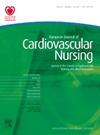2002 年营养风险筛查评分是心脏消融术后住院时间延长的预测指标
IF 3.9
3区 医学
Q2 CARDIAC & CARDIOVASCULAR SYSTEMS
引用次数: 0
摘要
背景 营养风险是影响各种疾病的死亡率、并发症和住院时间的公认因素。这种关系已在外科、肿瘤科和某些心血管疾病中得到证实。目的 本研究旨在分析营养风险筛查 2002(NRS 2002)评分是否能预测心脏消融术患者的住院时间和院内康复期(即从手术到出院的时间)。方法 这项回顾性研究纳入了 2023 年接受心脏消融术的 265 名患者。分析参数包括总体住院时间和消融术后的院内康复时间。这些参数与使用 NRS 2002 评估的营养风险、体重和体重指数相结合。分析还根据心律失常的类型进行了分组。结果 回归分析显示,NRS 2002 评分对总住院时间(B=0.89,P=0.003)和院内康复时间(B=0.57,P=0.02)有显著影响。亚组分析显示,心房颤动患者(B=1.10,p=0.001)和心房颤动患者(B=0.91,p=0.002)与住院总时间(B=0.92,p=0.001)、室性心律失常患者与康复时间(B=0.76,p=0.002)之间的关系尤为密切。体重指数越低,疗养时间越长(B=-0.05,P=0.03),主要影响心房颤动亚组(B=-0.08,P=0.04)和房性心律失常(B=-0.05,P=0.04)。结论 营养风险是影响心脏消融术患者住院时间和院内康复的一个因素,尤其是心房颤动患者。本文章由计算机程序翻译,如有差异,请以英文原文为准。
Nutritional Risk Screening 2002 score is a predictor of prolonged hospitalizations after cardiac ablation procedures
Background Nutritional risk is a recognized factor of mortality, complications, and length of stay at a hospital in various medical conditions. This relationship was already proven in surgery, oncology, and selected cardiovascular diseases. Purpose This study aimed to analyze, if the Nutritional Risk Screening 2002 (NRS 2002) score is a predictor of the hospitalization length and in-hospital convalescence period defined as the time from the procedure to discharge among patients undergoing cardiac ablations. Methods 265 patients who underwent cardiac ablation in 2023 were included in this retrospective study. The analyzed parameters included the overall length of stay and the time of the in-hospital convalescence after the ablation procedure. They were combined with the nutritional risk assessed with NRS 2002, body mass, and body mass index. The analysis was also performed in subgroups regarding the type of arrhythmia. Results The regression analysis revealed a significant impact of the NRS 2002 score on the overall length of stay (B=0.89, p=0.003) and the in-hospital convalescence time (B=0.57, p=0.02). Subgroup analysis revealed that this relationship was particularly strong in the atrial fibrillation patients (B=1.10, p=0.001 and (B=0.91, p=0.002 respectively), and in atrial arrhythmias for the overall length of stay (B=0.92, p=0.001), and ventricular arrhythmias for the convalescence time (B=0.76, p=0.002). Lower body mass index impacted the prolonged convalescence time (B= -0.05, p=0.03), mainly in the atrial fibrillation subgroup (B= -0.08, p=0.04) and atrial arrhythmias (B= -0.05, p=0.04). Conclusions Nutritional risk is a factor that impacts the length of stay and in-hospital convalescence in patients undergoing cardiac ablations, particularly in atrial fibrillation patients.
求助全文
通过发布文献求助,成功后即可免费获取论文全文。
去求助
来源期刊

European Journal of Cardiovascular Nursing
CARDIAC & CARDIOVASCULAR SYSTEMS-NURSING
CiteScore
5.10
自引率
10.30%
发文量
247
审稿时长
6-12 weeks
期刊介绍:
The peer-reviewed journal of the European Society of Cardiology’s Council on Cardiovascular Nursing and Allied Professions (CCNAP) covering the broad field of cardiovascular nursing including chronic and acute care, cardiac rehabilitation, primary and secondary prevention, heart failure, acute coronary syndromes, interventional cardiology, cardiac care, and vascular nursing.
 求助内容:
求助内容: 应助结果提醒方式:
应助结果提醒方式:


